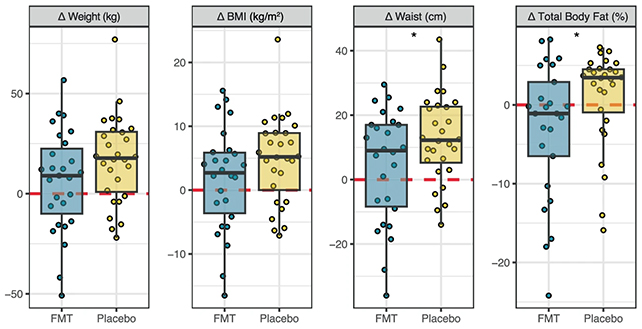There's growing evidence that the mix of bacteria in the gut affects obesity risk, and new research backs up the thinking that 'good' bacteria transferred via fecal microbiota transplants (FMT) could help boost metabolic health across several years.
In simple terms, metabolic health is how well our bodies are running, and turning food into energy. In this study, it was measured through what's known as metabolic syndrome: a cluster of health issues including high blood pressure, high levels of sugar and fat in the blood, waist circumference, and cholesterol.
Led by a team from the University of Auckland in New Zealand, the new research follows up on a study published five years ago, for which 87 obese young adults were given fecal transplant capsules containing gut bacteria mixed to promote a healthy metabolism.
Related: Study of Over 400,000 People Links Gut Bacteria With Insomnia Risk
"Metabolic syndrome has severe consequences, including a doubling in risk of death from heart disease or stroke and a five-fold increased risk of type 2 diabetes," says pediatric endocrinologist Wayne Cutfield, from the University of Auckland.
The transplant didn't have a noticeable effect on weight loss, but it did seem to reduce the risk of metabolic syndrome, thus limiting the likelihood of related diseases. Now, it's been shown that these health improvements can last for years.
"What is impressive is that just a single [FMT] treatment produced a dramatic reduction in metabolic syndrome that lasted at least four years," says Cutfield.
"This means participants are at much lower risk of developing diabetes and heart disease over the long term."

For the new research, follow-up tests were carried out on 55 of the original 87 study participants, 27 of whom had received the FMT treatment, with the remaining 28 given a placebo.
Again, there was no notable difference in body mass index (BMI) between the groups, but volunteers who had been given the FMT still had significantly better metabolic syndrome scores, with improved results across several health markers, including reduced body fat percentage.
In addition, the researchers found that the healthy mix of bacteria that had been transplanted four years prior were still in place to some extent. It means ongoing treatment might not always be needed.
Based on the extensive amount of research that's been done, it seems there's a two-way relationship between obesity and gut bacteria: what we eat of course affects the gut, but it seems the gut microbiome also influences weight and metabolism to some extent.
Taking a processed poop tablet may sound a little icky, and there are studies that suggest FMT has its own risks. However, other studies indicate various benefits, with these types of treatments used to tackle cancers, brain diseases, and aging in general.
Now we've seen what the long-term benefits might be, the researchers want to see tests on larger groups of people, and further work done to identify the particular mix of gut microbes that can promote metabolic health.
"Imagine being able to program your microbiome to reduce the risk of conditions before they occur," says geneticist Justin O'Sullivan, from the University of Auckland.
"This work is paving the way for next-generation probiotics that target specific conditions through sustained changes to the microbiome."
The research has been published in Nature Communications.
